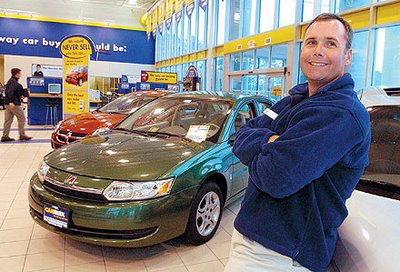CarMax Underappreciated By Wall Street
 Thanks to Carmax (KMX), buying used cars is no longer the royal headache it once was.
Thanks to Carmax (KMX), buying used cars is no longer the royal headache it once was.Say goodbye to the hassles and hard sells: as the #1 used car retailer, Carmax is rapidly expanding across the US and sucking up market share. After being spun off from Circuit City (CC) in 2002, Carmax has adapted extraordinairily well to the dizzying ride we call the auto industry. With its customer friendly, transparent store format, Carmax connects with its customers in a wholly unique yet professional way: think immaculate garages matched with a well-trained sales staff (vehicles are moved through the facility, assembly-line format, in about half an hour). Taken together, it's no wonder the company has grown its sales and earnings approximately 20% over the last 5 years.
This is incredible, considering how much competition Carmax has. We believe that were it not for Carmax's broad inventory, domain expertise, and customer captivity, it'd be a dead duck. Instead, we find a company that's underappreciated by most of Wall Street. Carmax only operates 65+ stores in 17 states, so there is huge room for growth. As it stands, KMX only has 1% of the market it operates in (a pie worth $350B dollars). To open new revenue streams, Carmax has decided to start offering financing and maintenance services. Most importantly, Carmax is heavily focused on new outlet openings as it strives to hit its $10B in annual revenue goal for 2010.
In a word, Carmax is growing faster than its industry and it enjoys a brand visibility we think will mushroom in the years to come. New store openings should boost growth; we expect that the value created from capital spending will supercede the company's cost of capital. Although Carmax has roughly 4x as much debt on its balance sheet than it has cash, the company has no problem servicing its interest expenses. We view its current cap ex committment in a positive light and we also take pleasure in the fact that insiders hold over 10% of the shares outstanding.
If only the Street was as optimistic as we are -- over 12% of the float is short. Risks to our thesis include aggressive price cuts/sustained discounting from the Detroit giants, (which would narrow the price gap between new and used autos) as well as an abrupt economic downturn. Lastly, we should mention that current CEO Austin Ligon will step aside once a successor is found later this year. We do not think this managerial change will impair company performance, and any and all news related to Ligon's departure has already been factored into the stock price.
<< Home